
By Mark Maslin
The Conversation
The fossil fuel industry, political lobbyists, media moguls and individuals have spent the past 30 years sowing doubt about the reality of climate change – where none exists. The latest estimate is that the world’s five largest publicly-owned oil and gas companies spend about $200 million a year on lobbying to control, delay or block binding climate policy.
Their hold on the public seems to be waning. Two recent polls suggested over 75 percent of Americans think humans are causing climate change. School climate strikes, Extinction Rebellion protests, national governments declaring a climate emergency, improved media coverage of climate change and an increasing number of extreme weather events have all contributed to this shift. There also seems to be a renewed optimism that we can deal with the crisis.
But this means lobbying has changed, now employing more subtle and more vicious approaches – what has been termed as “climate sadism.” It is used to mock young people going on climate protests and to ridicule Greta Thunberg, a 16-year-old young woman with Asperger’s, who is simply telling the scientific truth.
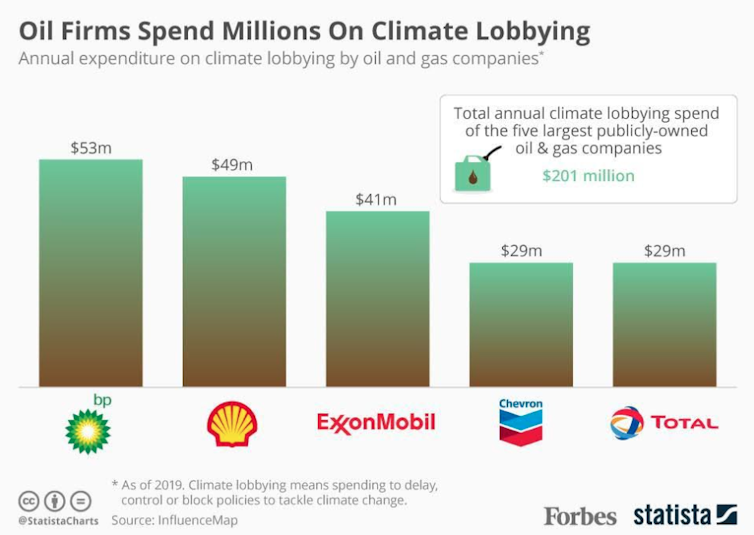
At such a crossroads, it is important to be able to identify the different types of denial. The below taxonomy will help you spot the different ways that are being used to convince you to delay action on climate change.
No. 1. Science Denial
This is the type of denial we are all familiar with: that the science of climate change is not settled. Deniers suggest climate change is just part of the natural cycle. Or that climate models are unreliable and too sensitive to carbon dioxide.
Some even suggest that CO? is such a small part of the atmosphere it cannot have a large heating affect. Or that climate scientists are fixing the data to show the climate is changing (a global conspiracy that would take thousands of scientists in more than a 100 countries to pull off).
All these arguments are false and there is a clear consensus among scientists about the causes of climate change. The climate models that predict global temperature rises have remained very similar over the last 30 years despite the huge increase in complexity, showing it is a robust outcome of the science.
Read more:
Five climate change science misconceptions – debunked
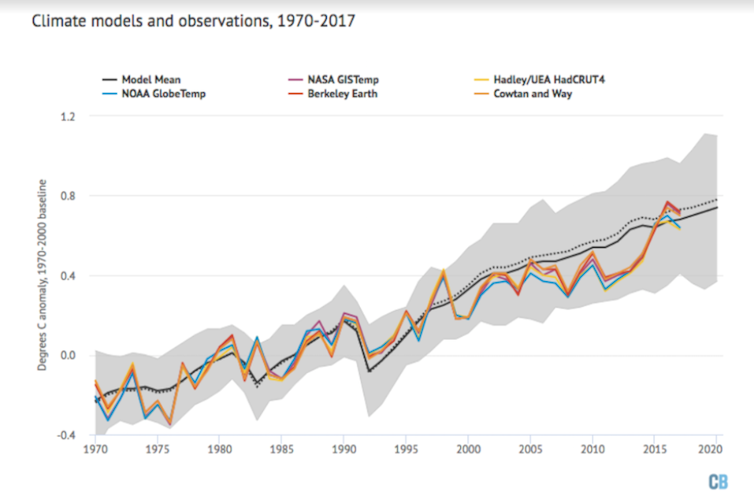
The shift in public opinion means that undermining the science will increasingly have little or no effect. So climate change deniers are switching to new tactics. One of Britain’s leading deniers, Nigel Lawson, the former U.K. chancellor, now agrees that humans are causing climate change, despite having founded the sceptic Global Warming Policy Foundation in 2009.
It says it is “open-minded on the contested science of global warming, [but] is deeply concerned about the costs and other implications of many of the policies currently being advocated.” In other words, climate change is now about the cost not the science.
No. 2. Economic Denial
The idea that climate change is too expensive to fix is a more subtle form of climate denial. Economists, however, suggest we could fix climate change now by spending 1 percent of world GDP. Perhaps even less if the cost savings from improved human health and expansion of the global green economy are taken into account. But if we don’t act now, by 2050 it could cost over 20 percent of world GDP.
We should also remember that in 2018 the world generated $86,000,000,000,000 and every year this World GDP grows by 3.5 percent. So setting aside just 1 percent to deal with climate change would make little overall difference and would save the world a huge amount of money. What the climate change deniers also forget to tell you is that they are protecting a fossil fuel industry that receives $5.2 trillion in annual subsidies – which includes subsidized supply costs, tax breaks and environmental costs. This amounts to 6 percent of world GDP.
The International Monetary Fund estimates that efficient fossil fuel pricing would lower global carbon emissions by 28 percent, fossil fuel air pollution deaths by 46 percent, and increase government revenue by 3.8 percent of the country’s GDP.
No. 3. Humanitarian Denial
Climate change deniers also argue that climate change is good for us. They suggest longer, warmer summers in the temperate zone will make farming more productive. These gains, however, are often offset by the drier summers and increased frequency of heatwaves in those same areas. For example, the 2010 “Moscow” heatwave killed 11,000 people, devastated the Russian wheat harvest and increased global food prices.
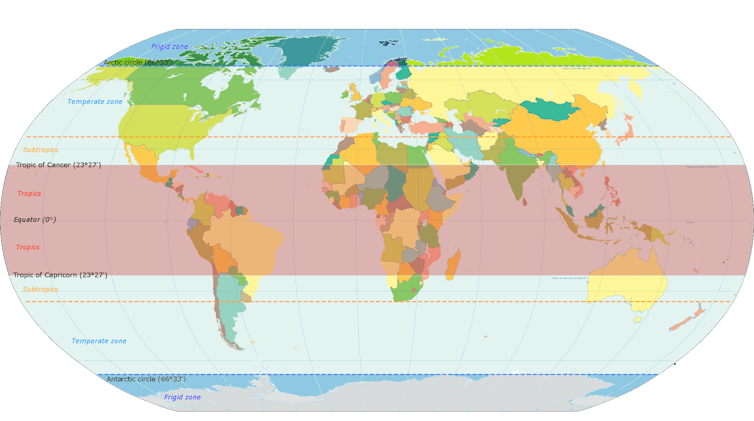
More than 40 percent of the world’s population also lives in the Tropics – where from both a human health prospective and an increase in desertification no one wants summer temperatures to rise.
Deniers also point out that plants need atmospheric carbon dioxide to grow so having more of it acts like a fertiliser. This is indeed true and the land biosphere has been absorbing about a quarter of our carbon dioxide pollution every year. Another quarter of our emissions is absorbed by the oceans. But losing massive areas of natural vegetation through deforestation and changes in land use completely nullifies this minor fertilization effect.
Climate change deniers will tell you that more people die of the cold than heat, so warmer winters will be a good thing. This is deeply misleading. Vulnerable people die of the cold because of poor housing and not being able to afford to heat their homes. Society, not climate, kills them.
This argument is also factually incorrect. In the U.S., for example, heat-related deaths are four times higher than cold-related ones. This may even be an underestimate as many heat-related deaths are recorded by cause of death such as heart failure, stroke, or respiratory failure, all of which are exacerbated by excessive heat.
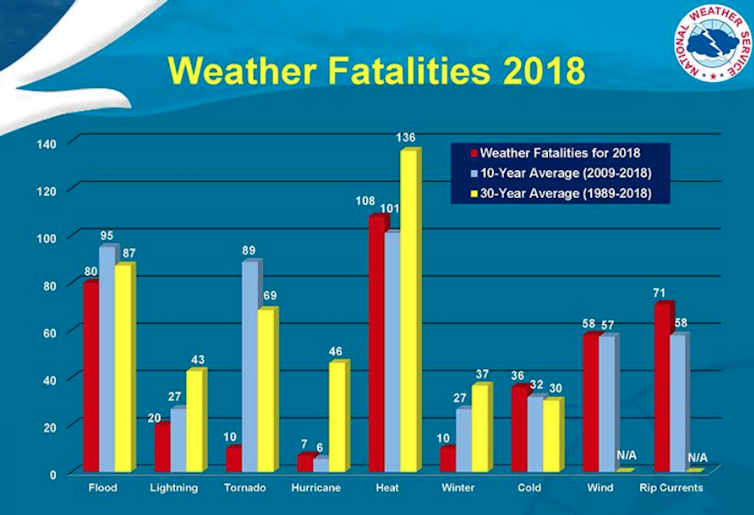
No. 4. Political Denial
Climate change deniers argue we cannot take action because other countries are not taking action. But not all countries are equally guilty of causing current climate change. For example, 25 percent of the human-produced CO? in the atmosphere is generated by the U.S., another 22 percent is produced by the EU. Africa produces just under 5 percent.
Given the historic legacy of greenhouse gas pollution, developed countries have an ethical responsibility to lead the way in cutting emissions. But ultimately, all countries need to act because if we want to minimise the effects of climate change then the world must go carbon zero by 2050.
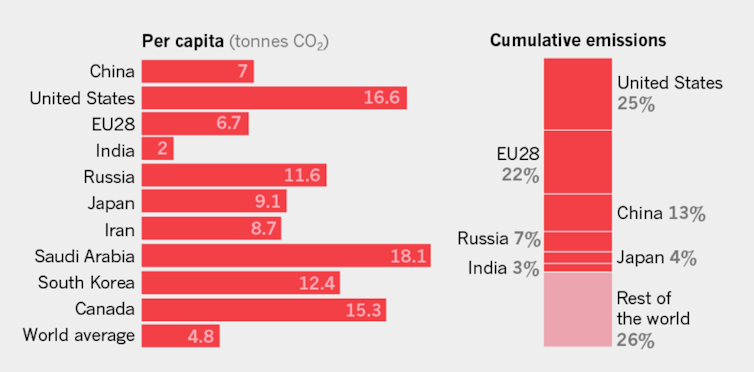
Deniers will also tell you that there are problems to fix closer to home without bothering with global issues. But many of the solutions to climate change are win-win and will improve the lives of normal people. Switching to renewable energy and electric vehicles, for example, reduces air pollution, which improves people’s overall health.
Developing a green economy provides economic benefits and creates jobs. Improving the environment and reforestation provides protection from extreme weather events and can in turn improve food and water security.
No. 5. Crisis Denial
The final piece of climate change denial is the argument that we should not rush into changing things, especially given the uncertainty raised by the other four areas of denial above. Deniers argue that climate change is not as bad as scientists make out. We will be much richer in the future and better able to fix climate change. They also play on our emotions as many of us don’t like change and can feel we are living in the best of times – especially if we are richer or in power.
But similarly hollow arguments were used in the past to delay ending slavery, granting the vote to women, ending colonial rule, ending segregation, decriminalising homosexuality, bolstering worker’s rights and environmental regulations, allowing same sex marriages and banning smoking.
The fundamental question is why are we allowing the people with the most privilege and power to convince us to delay saving our planet from climate change?
Mark Maslin is professor of earth system science, UCL.
This article is republished from The Conversation under a Creative Commons license. Read the original article.
The views expressed are solely those of the author and may or may not reflect those of Consortium News.
Before commenting please read Robert Parry’s Comment Policy. Allegations unsupported by facts, gross or misleading factual errors and ad hominem attacks, and abusive or rude language toward other commenters or our writers will not be published. If your comment does not immediately appear, please be patient as it is manually reviewed. For security reasons, please refrain from inserting links in your comments, which should not be longer than 300 words.

alternative energy sources are not clean. Rare earth mining extremely dirty, only the Chinese will do it. why not incentivize carbon recapture, cleaning up plastic out of the ocean. Carbon recapture can be done producing carbon nanofibers with many potential applications
See: www(dot)greencarcongress(dot)com/2017/03/20170327-licht(dot)html
push the greedy capitalists to make a buck out of that…use your heads instead of making it a good vs bad us vs them scenario where everyone loses. You have to wonder if you’re thinking is correct if the Pope is on your side( flat earth anyone).
We will need fossil fuels in natural disasters. Mankind has invented some crazy good stuff, let’s not drop it all but find reasonable solutions. Making LNT a mandatory educational requirement would be a good start…
People who have lied and lied again for forty years to forestall action, despite well knowing how catastrophic it will be, are ‘bad’. With a capital B.
I am writing a historical fiction story, and studying the mound builder society(s) of the eastern US. I was surprised to learn that there were thousands of mounds–particularly east of the Mississippi, with small cities, suburbs, interconnecting roads and extensive trail systems 1000 years ago.
Much of the this has been semi-effectively whitewashed by the Smithsonian et. al.
There are solid references to the “Great Drought” that occurred from 1276 A.D. to 1299 A.D. across the North American continent. Apparently the cultures in the southwest, already being in dry country suffered dramatically–forcing migration, but the drought may also have contributed to the exit from the eastern mound cities as well. Orthodox archaeologists claim they ended about 1350 A.D. How this temporary climate change affected central American cultures is unclear. It makes me want to engage in a world-wide study to determine what may have caused the 1276 American drought. Solar activity? Vulcanism? Asteroid impact?
“Switching to renewable energy and electric vehicles, for example, reduces air pollution, which improves people’s overall health”
Much important is to get people out of cars and onto public transport, bicycles and their own two feet. Car ownership is a luxury the planet can’t afford. We can’t afford the pollution the desecration of the environment and the wars over oil. Neither can we afford the petrodollar being used to suffocate economies in the way it is. But despite the fact that wide car ownership has been around for less than a century, most people in the western world see it as an indispensable right. Not on a indespensable planet it isn’t.
It may improve their health but it will shorten their life expectancy. Take a look at the Aerosol Masking Effect.
Excellent. Thanks
The argument that warmer winters may save lives, is more correctly answered by pointing out that the extremes of weather resulting from climate change include far more dangerous extremes of cold as well as the minor effect of average warming. In addition to this, the summer extremes of temperature out-weigh the minor average temperature increases. In either event, the unpredictability and the extremes at each end of the temperature range is the problem. Even more extreme, economically, are the extremes of precipitation and of drought.
What about a DIFFERENT baseline ( than the 1970-2000 reference) to establish the anomalies?
Denial has not been only 30 years. US political leaders and corporate spin merchants have been actively attempying to derail climate action for the entire 48 years since my first exposure to the science. This was in engineering studies, in 1971, and the prognostication was fully developed and accurate at that time.
In summary: While you would not be aware of one or two degrees of average temperature rise, as sensible heat, nevertheless it would provoke “extremes and unpredictability of weather patterns and events”.
There followed decades of lobbyists, pseudo-scientists, and politicians, all mis-interpreting this prognosis, the degrees of uncertainty, and the economic costs of climate mitigation or of inaction.
Thank you Mark Maslin for this piece and Consortium News for your focus on this existential threat to life on this planet.
Not surprisingly, Senator Sanders’s respect for the urgency of what the scientists are telling us makes him the candidate who explains best and will fight hardest for what needs to be done NOW including a just transition.
Googling – Bernie Sanders on the issues – gets you to the details of the Green New Deal
The claim to a comprehensive analysis of climate change denial is much to be appreciated. Much to be regretted is the failure to identify any potentially dangerous limitation to the framing offered. As but the most recent claim to unquestionable truth it follows a pattern which religions and ideologies have righteously explored in the expectation of convincing the world of a fundamental truth — however inconvenient. Missing from the analysis is why both populations and leaders respond so inadequately and variously to such convictions. Unfortunately insights into the “why” lie in the realm of the psycho-social — a domain alien to the factual preoccupations offering analyses held to be systemically adequate by the natural sciences. In this sense the article is dangerously incomplete in obscuring the subtleties by which appropriate change of the “climate of opinion” might be engendered — rather than the tokenistic tinkering which may be achieved by COP25. This is a “sixth corrupt pillar of climate change denial” — a denial by those authorities in asserting that others are in denial.
By definition 50% of the population is of below media intelligence. They are bombarded by propaganda from the Rightwing MSM, advertising, PR, think-tanks and ‘entertainment’, 24/7 from birth. They are metabolically deranged by junk-food diets and ubiquitous pollution. And denialism i a death-cult known only in the West and the Anglosphere in particular. They will happily go on stuffing their faces until Doomsday, which a large portion of them, the religious imbeciles, are looking forward to. And they will oppose environmentalism and Greens with vigour.
Great article! I’ve been following the destruction of the biosphere for quite some time.
Adding to this massive deception is the fact that the majority of people do not understand, nor have the patience to understand the scientific method. Scientists by their own training are very conservative in stating their findings. The Intergovernmental Panel on Climate Change, IPCC, reached a consensus and published their findings in October, 2018, as a partial solution to limit the global temperature increase to 1.5 C.
“The report finds that limiting global warming to 1.5°C would require “rapid and far-reaching” transitions in land, energy, industry, buildings, transport, and cities. Global net human-caused emissions of carbon dioxide (CO2) would need to fall by about 45 percent from 2010 levels by 2030, reaching ‘net zero’ around 2050. This means that any remaining emissions would need to be balanced by removing CO2 from the air.”
After this point it will be very difficult to keep the climate from accelerating into a runaway state that will be impossible to recover.
What people do not understand is that when an internationally recognized group of scientists reach a consensus, the finding they reach should be considered a fact. It is not debatable.
The fossil fuel industies’ current arguments might be summed up simply by the following:
“Why should we let the survival of the human species get in the way of short term profits?”
www (dot)ipcc (dot) ch/2018/10/08/summary-for-policymakers-of-ipcc-special-report-on-global-warming-of-1-5c-approved-by-governments/
I think we can add to the economic denial idea. That money if spent would be in productive investments. Alternative energy is the production and sale of energy. It is not just cost down the tubes, like fighting a war.
We should also add that those urging concern for climate change are themselves often in denial about the problem. They accept the false idea of gradualism, and the false idea that it can be fixed. It’s biggest risks are of a tipping point. It is already happening, so it can and must be be dealt with, but it can no longer be fixed — we are well past that. The denial crowd is arguing against those who mistaken tend to minimize the problem.
If we saw the real investment, and the real scale of risks already playing out, it would be a different debate on both sides.
Well Said
The author starts by stating that 75% of Americans are believers in climate change and that human activity is responsible. He then concludes stating the fundamental question is, “Why are we allowing the people with the most privilege and power to convince us to delay saving our planet from climate change?”
If the first statistic is to be accepted then clearly the deniers have lost the argument. Of course, those same Americans who accept human activity as the cause continue to be among the highest per capita polluters in the world. Most folk I know care more about cheap gas and electricity than they do making real changes to their consumerist life style.
My concerns aren’t with the deniers. It is with the true believers who advocate for broad solutions without truly understanding how wrong (the collective) we could get things. The Bolivians are learning now how having an abundance of lithium (for the author’s EV cars) can lead to government overthrow. The activists with the mic and pen have demonstrated virtually complete ignorance about regenerative agriculture and its ability to reverse desertification. Finally, given the effects of fire, flood, wind and draught the immediate mitigation seems lost in the conversation about taking on big oil.
Those 75% of believers need to ask the real fundamental question, “Is it I?”
All this is so interesting and frightening it is a real pity we never get to read well informed articles about what exactly are we to do to reduce our emissions. I would like to read something like the number of wind-mills and solar panels we need to install by 2050 to get to zero emissions, what other type of alternative energy sources we may expect in the next few years, and stuff like this.
Instead we only get loads of articles explaining how idiotic the idiots who deny climate change are. The only way to fight idiots is by coming up with something intelligent that will leave them in awe. Expecting to eliminate idiocy is useless, and even a little idiotic. Remember De Gaulle who, upon hearing someone say “death to idiots”, commented “Vaste programme” (a huge program)
Just a dry annotation:
Mark Maslin writes under “No. 3. Humanitarian Denial” the following: “Climate change deniers also argue that climate change is good for us. They suggest longer, warmer summers in the temperate zone will make farming more productive. These gains, however, are often offset by the drier summers and increased frequency of heatwaves in those same areas. For example, the 2010 “Moscow” heatwave killed 11,000 people, devastated the Russian wheat harvest and increased global food prices.”
Now have a look to the Russian wheat harvest figures in more recent years. Here is a graph for Russian wheat production from 1987 to 2019:
www (dot)indexmundi.com/agriculture/?country=ru&commodity=wheat&graph=production
Russia realized in the most recent years one bumper wheat harvest after the other, having a wheat production level now far higher than anytime before.
While one may well argue that climate change isn’t the driving force behind that positive development, to pick the harvest 2010 to suggest that climate change is bad for Russian wheat production I find not representative.
Climate is one of the least important variables in the particular case of Russian Agriculture in an era of sanctions. This is not to say that climate in unimportant merely that the rapid revival of agriculture in Russia has political causes: sanctions made it imperative to develop self sufficiency.